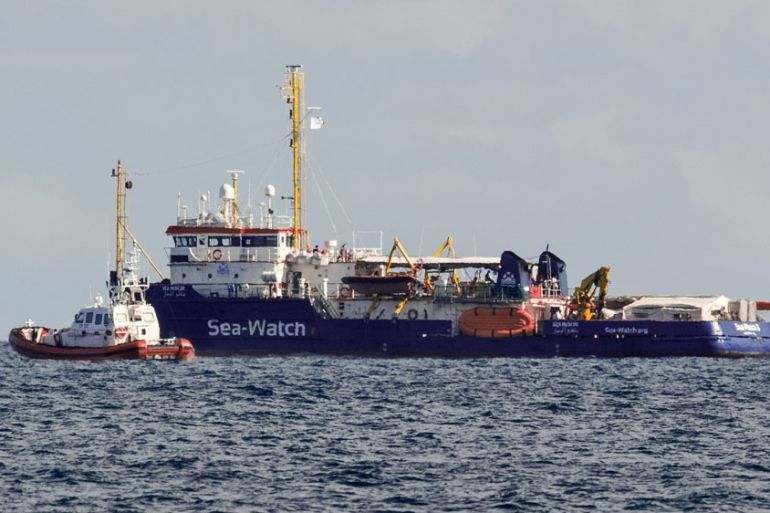‘Saving lives isn’t a crime’: Italy slammed for ‘security decree’
Rescue workers pulling desperate migrants from the Mediterranean could face huge fines after entering Italian waters.

Rome, Italy – The Italian government has come under fire after passing a “security decree” that aims to curb migration by punishing charity search and rescue operations in the Mediterranean, despite repeated warnings – including from the United Nations – that the new rules violate the rights of refugees and rescuers alike.
Parts of the recently introduced measure are unrelated to migration, but instead focus on “public order and security”, increasing penalties for assault on members of the security forces and envisaging fines of up to 6,000 euros ($6,700) for people who hide their faces to avoid being identified during political demonstrations.
Keep reading
list of 4 itemsUN report charts lethal cost of migration over past decade
Conflict, climate, corruption drive Southeast Asia people trafficking: UN
Bodies of three Rohingya found as Indonesia ends rescue for capsized boat
But the decree, which was championed by far-right Interior Minister Matteo Salvini, also gives additional power to the Ministry of the Interior on issues of migration, and mandates that ships which “ignore bans and limitations” on entering Italian waters will be seized.
The captain and crew could also be hit with fines of up to 50,000 euros ($56,000).
The UN refugee agency (UNHCR) warned last week that the new rules violate the rights of migrants and rescuers alike, saying that “no vessel or shipmaster should be at risk of a fine for coming to the aid of boats in distress and where loss of life may be imminent” and that “no-one should be returned to Libya”. Despite the criticism, Italian President Sergio Mattarella signed the bill on Friday, meaning that the law is now in force.
“Saving lives is not a crime,” Claudia Lodesani, president of medical NGO Doctors Without Borders Italy, told Al Jazeera. “It is a legal obligation that EU member states should make a priority. But, once again, Italy shows little sensitivity to international obligations.”
Denying access
Italy’s governing coalition between Salvini’s far-right League and the populist Five Star Movement has repeatedly denied NGO rescue ships access to Italian ports, leaving migrants stranded at sea for weeks. Salvini, especially, has described NGO ships as “sea taxis” and accused charity workers of working with human traffickers.
Threats of confiscations, fines and legal investigations have caused most NGO boats to abandon their work in the Mediterranean.
“It’s hard to see the rationale for punishing search and rescue at sea,” said Matteo Villa, of the Italian Institute for International Political Studies (ISPI). “Especially since arrivals by sea have shrunk so drastically.”
According to data released by the interior ministry, 2,144 migrants arrived in Italy by sea between January 1 and June 10, 85 percent fewer than those who arrived in the same period in 2018, and 96 percent fewer than the year before.
“It’s interesting that Italy’s migration policy is so disconnected from reality,” Villa told Al Jazeera. “But this kind of policy is bent on getting consensus, especially on the side of Salvini’s League, which chooses to focus on what is happening at sea, rather than on the problems on shore.”
NGO rescue ships have long been accused of being a “pull factor” for people attempting to cross the Mediterranean, but data collected by ISPI contradicts this: between May 1 and June 7, at least 3,092 people left the Libyan coast, but during that period there was only one rescue boat – Sea Watch – present, and that was only operating for a five-day period.
“So as you can see, the number of people leaving Libya does not depend on NGO activity,” Villa said.
Dario Belluccio, a lawyer with The Association for Juridical Studies on Immigration (ASGI), said the European Union, of which Italy is a member, was responsible for refugee deaths in the Mediterranean.
“One thing to keep in mind is that these humanitarian organisations are doing what they do because the states of the European Union have abandoned their activities of search and rescue,” he told Al Jazeera. “But that doesn’t mean we shouldn’t focus on Italy’s behaviour, because there is no excuse for it.”
Salvini wasted no time in enforcing the new rules, and on Saturday announced he had signed a directive to “ban Sea Watch 3 from entering, transiting, and stopping in Italian waters, as required by the New Security Decree”.
Libyan authorities had allocated Libya’s Tripoli as a safe port for the disembarkation of 53 people rescued by the Sea Watch vessel on Tuesday, but the German NGO instead headed for the Italian island of Lampedusa. Once there, 10 women, children and men affected by serious health conditions were allowed to disembark.
A group of 43 people, among them three unaccompanied children, are still on board.
Italy’s interior ministry didn’t not respond to requests for comment for this report.